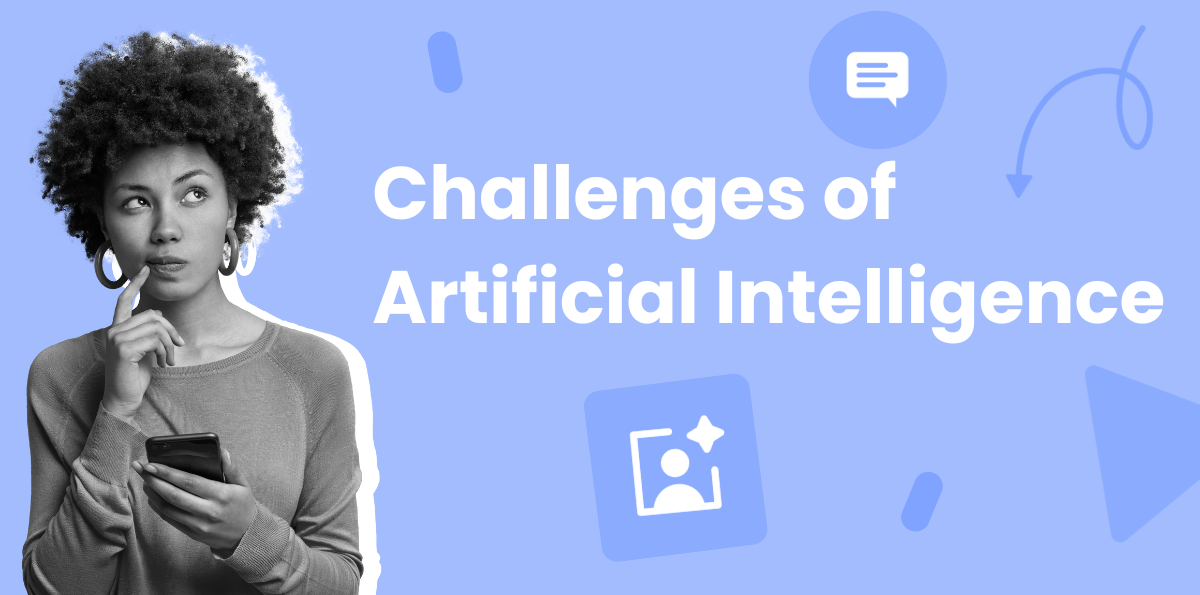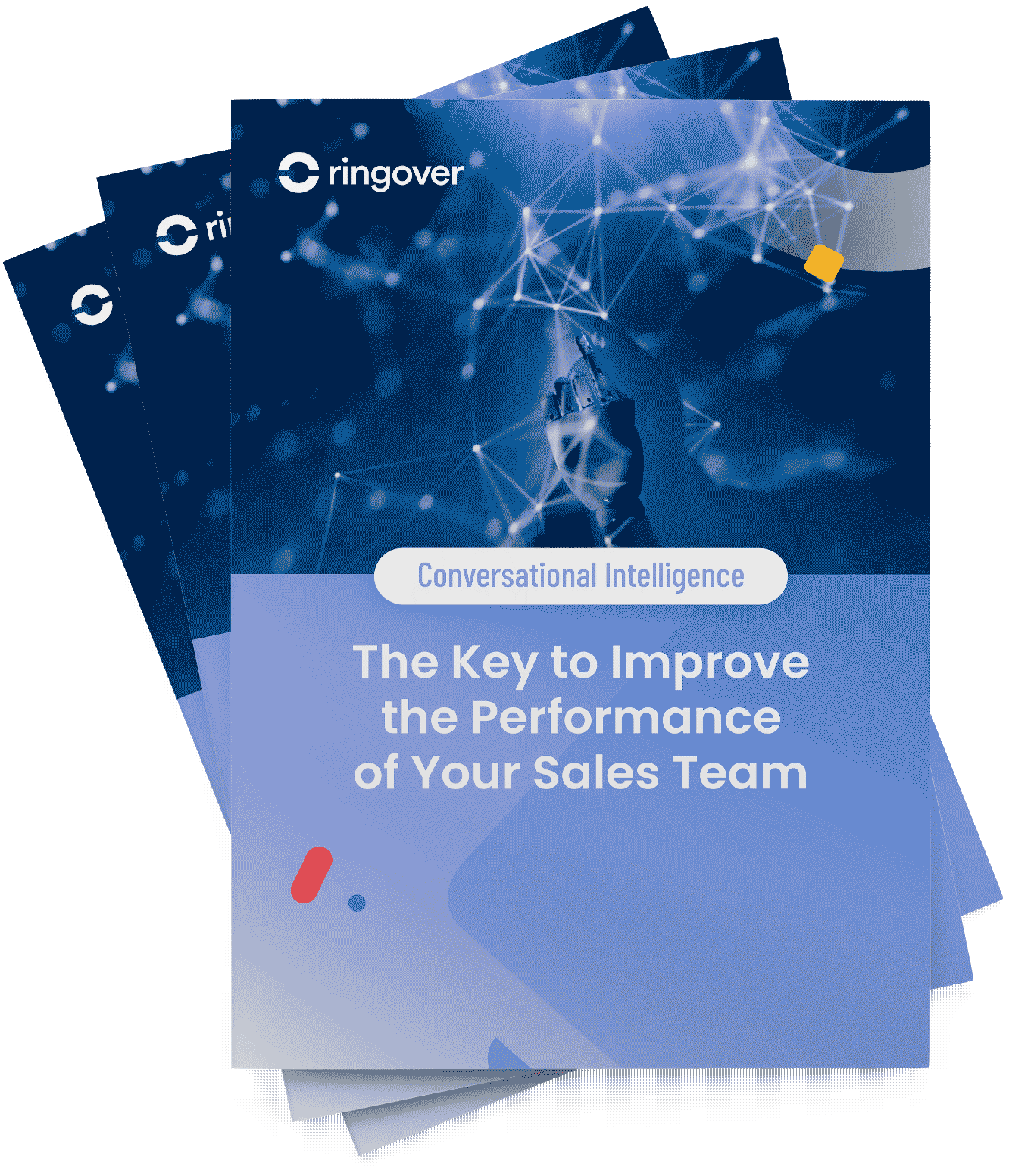Summary
In this article, we will explore the challenges that companies face when adopting artificial intelligence, from planning and implementation to ethical and privacy aspects. We will detail how task automation can affect employment and how companies can address these challenges to successfully include AI trends in their operations.
As artificial intelligence for businesses becomes more intelligent and autonomous, the need arises to establish clear regulations and guidelines to ensure the responsible use of this technology.
What are the challenges of Artificial Intelligence for businesses?
AI in business refers to the integration of advanced AI-enabled technologies and techniques within organizations with the goal of improving various business functions. This integration encompasses everything from routine tasks such as data collection and analysis to more complex operations like the automation of customer service with inbound call center software.
Additionally, using AI in outbound call center software for sales prospecting allows companies to optimize efficiency and productivity by applying AI to a wide variety of tasks. For example, call center AI is used to automate routine and repetitive processes, perform advanced data analysis, make data-driven decisions, personalize customer experiences, and improve the accuracy of logistics operations.
The adoption of AI in businesses aims to contribute to digitization, especially in various industries like digital transformation in insurance, enabling employees to focus on more strategic and creative tasks because repetitive and lower-value tasks are automated. This not only increases efficiency but also frees up time for employees to focus on higher value-added work.
What are the challenges of artificial intelligence implementation?
Implementing artificial intelligence presents several challenges. Some of the main challenges include:
1. Integrations ✅
Implementing AI often involves integrating it with CRM tools. Ensuring seamless integration and compatibility can be a complex task, requiring careful planning and proper coordination. Ringover allows AI integration with over 50 integrations, including Salesforce, Hubspot, Pipedrive, Zendesk, and staffing technology like Bullhorn, Vincere, and Recruit CRM.
2 . Lack of Understanding ✅
Many people may be skeptical or reluctant to trust AI systems due to a lack of understanding about how they work. Building trust requires transparency and explainability in AI algorithms and decision-making processes.
3. Data Quality and Availability ✅
AI systems heavily rely on data to learn and make predictions. Ensuring the quality, relevance, and availability of data can be challenging. It is crucial to have adequate and diverse datasets to train AI models accurately.
4. Ethics and Privacy ✅
AI systems often handle personal and sensitive data. Protecting privacy and ensuring the ethical use of data is a significant challenge. Organizations must establish robust data protection policies and comply with privacy regulations.
5. Bias and Fairness ✅
AI algorithms can inadvertently amplify existing biases if the training data includes biased information. Ensuring fairness and reducing bias in AI systems is an ongoing challenge that requires careful curation of datasets and thoughtful algorithm design.
6. Lack of Skilled Professionals ✅
Implementing AI requires expertise in data science, machine learning, and AI technologies. There is a shortage of skilled professionals in these domains, making it difficult for organizations to find and retain qualified talent.
7. Cost and Infrastructure ✅
AI implementation can be costly, requiring investment in infrastructure, computing power, and ongoing maintenance. Organizations need to assess financial feasibility and ensure the availability of necessary resources.
How does artificial intelligence help businesses?
Artificial intelligence is having a significant impact on businesses, transforming the way they operate and generating various benefits. On one hand, the adoption of AI enables companies to automate processes, improve decision-making, and optimize operations, which helps increase efficiency and reduce costs.
By utilizing AI, organizations can generate predictive insights, personalize customer experiences, and optimize supply chain management, logistics, and human resources. For example, AI applied to the insurance sector can help eliminate tedious tasks or reduce the risk of errors, such as invoice processing, quality control, and data entry.
However, the adoption of AI also poses challenges. It is necessary to design and implement this technology effectively, establish ethical guidelines, and address skill gaps in the workforce.
Success Stories of Artificial Intelligence in Businesses
Here are some artificial intelligence examples has impacted various companies:
- Spotify and Netflix: These companies use AI tools for personalized product and service recommendations, leading to increased customer satisfaction and engagement.
- Various Industries: Companies across different sectors are implementing AI to improve processes and profitability. From online retail to automobile production, AI is transforming how businesses operate and compete in today's market.
- Innovation Acceleration: AI accelerates innovation by assisting in idea generation, product design, and process improvement. It can also identify market opportunities based on data, providing companies with a competitive edge.
- Customer Service: AI is used in customer service for chatbots and voice assistants, automating routine inquiries and providing 24/7 support to enhance customer experience and retention.
- Facial Recognition Technology: AI-powered facial recognition technology is widely used for security purposes, improving access control and surveillance systems within companies.
These examples demonstrate how AI is successfully leveraged by businesses across various sectors to drive innovation, enhance operational efficiency, and improve customer experience.
Using a conversation intelligence software ensures you process large amounts of unstructured data, like audio files, so you can get closer to your clients.
Conclusion
In conclusion, having a robust AI tool in a company is crucial for several reasons:
- Task Automation: AI can automate routine and repetitive tasks, allowing employees to focus on more strategic and value-added activities. This increases efficiency and productivity in the company.
- Informed Decision-Making: AI can analyze large volumes of data in real-time and provide relevant insights for business decision-making. This helps in identifying patterns, trends, and opportunities that can aid in making more accurate, data-driven decisions.
- Enhanced Customer Experience: AI enables the personalization of customer experiences by analyzing their preferences and behaviors. This facilitates the delivery of personalized products and services, as well as more efficient and effective customer support.
- Innovation and Adaptation: AI drives innovation by offering new ways to address problems, identify opportunities, and develop solutions. Additionally, the ability to quickly adapt to market changes and customer demands becomes easier with AI support.
Empower by Ringover is a standout AI tool for businesses due to its ability to enhance customer service, commercial prospecting, and business growth. This conversation intelligence software integrates advanced algorithms that enable employees to provide the most suitable responses to customers in various situations, thanks to sentiment analysis.
Moreover, among the various features of Empower by Ringover are a conversation analysis function and an AI transcription software, which ensure better monitoring of customer interactions and more effective identification of relevant information.
Don't wait any longer—try Empower by Ringover for free and discover how a good AI solution can help drive any process in your business.

Challenges of Artificial Intelligence FAQ
How to Apply AI to a Business?
To apply AI in a business, you can follow these steps:
- Evaluate Needs and Opportunities: Identify the areas and processes in the company that could benefit from AI application, such as operational efficiency improvements, supply chain optimization, product or service personalization, among others.
- Define Objectives: Set clear and specific goals to be achieved with AI implementation, such as increasing productivity, reducing costs, or enhancing customer experience.
- Collect and Prepare Data: AI relies on the analysis of large amounts of data, so it's important to gather and prepare the necessary information to train AI models. This involves improving data quality and ensuring it is representative and relevant.
- Select the Right Tools and Algorithms: There are various AI tools and algorithms, such as machine learning, natural language processing (NLP), or image recognition, that can be used depending on the specific needs of the business.
- Train AI Models: Use the collected data to train and adjust AI models to make accurate and automated decisions. This involves testing and validation to ensure the models function correctly.
- Implement and Monitor Models: Integrate AI models into the company's processes and establish mechanisms to continuously monitor and update their performance. This includes defining evaluation metrics and setting up a feedback process to improve model accuracy and efficiency over time.
It's important to note that implementing AI in a business requires a strategic approach and the involvement of skilled professionals. Additionally, ethics and data privacy must be considered in the use of AI.
How Does Artificial Intelligence Affect Businesses?
Artificial intelligence affects businesses in various ways by providing the ability to optimize processes, improve decision-making, personalize customer experiences, and increase overall efficiency. With the continuous advancement of AI, organizations can benefit from greater efficiencies, time savings, and cost reductions, positioning them more competitively in the market.
However, implementing AI also entails certain risks and challenges, such as the need to properly manage data ethics and privacy, as well as the potential over-reliance on technology for critical business decisions. It is crucial for businesses to address these challenges with a solid strategy and an ethical approach to ensure the responsible and effective use of AI in their operations.
Published on June 26, 2024.



